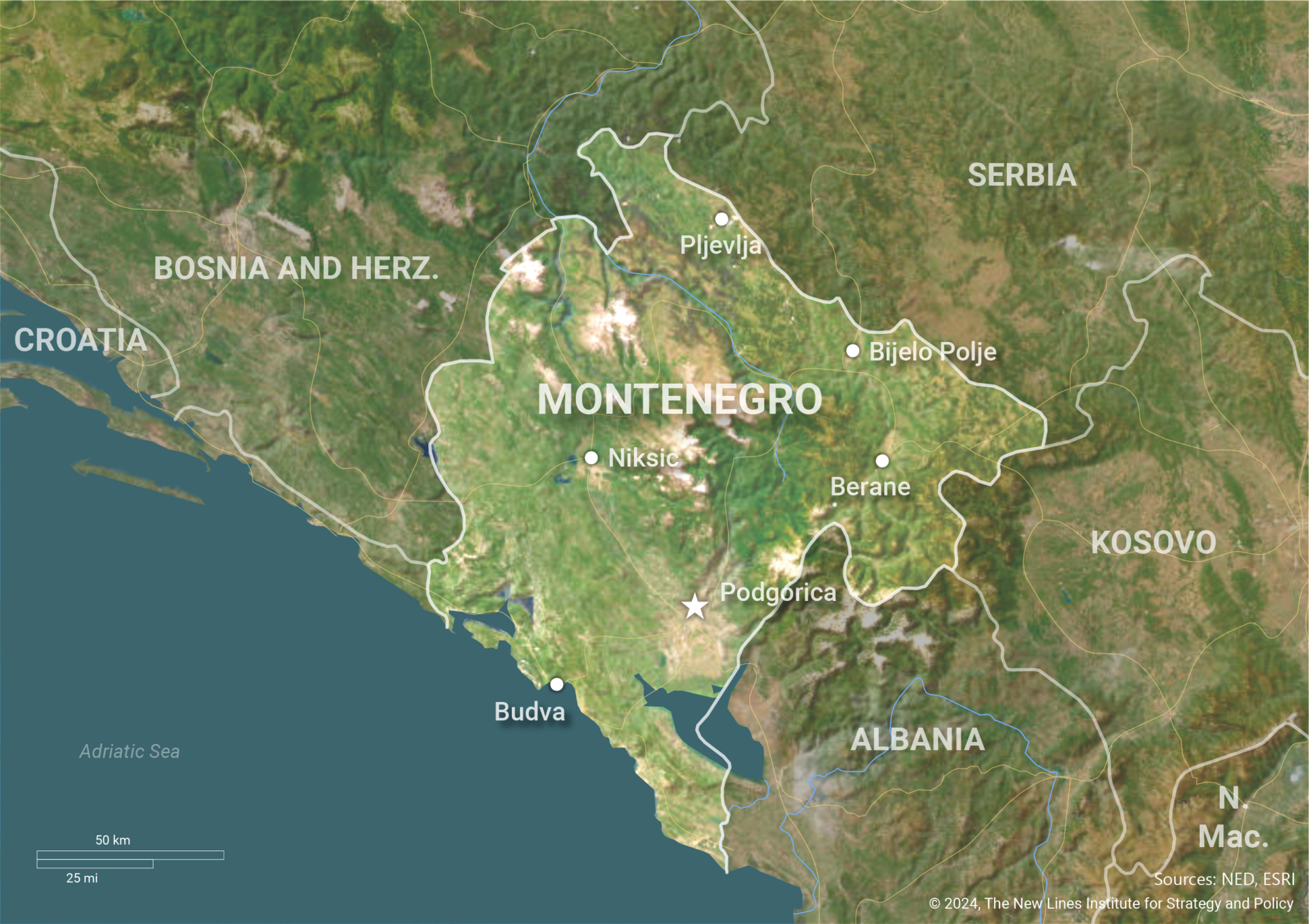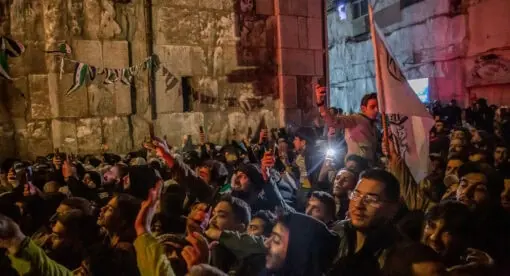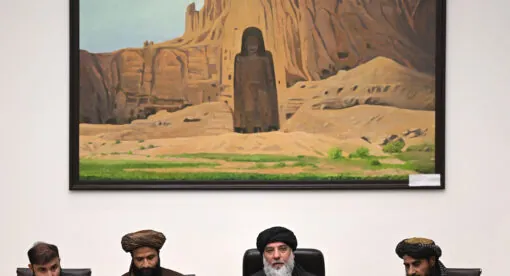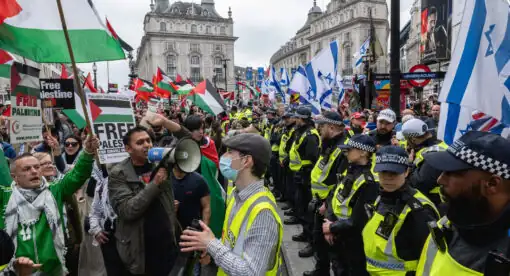Introduction
Montenegro, a small Balkan country with a complex geopolitical landscape, has encountered myriad security challenges influenced by its location, history, and internal dynamics, particularly following its accession to NATO in 2017. NATO membership was aimed at bolstering Montenegro’s security and defense capabilities, but it also brought to the fore new and existing security threats that require meticulous consideration and strategic planning. As a result, security challenges in Montenegro encompass a spectrum of issues that significantly affect the country’s internal political stability, sovereignty, and regional security dynamics.
Montenegro’s Security Tapestry
Montenegro’s strategic location between the Adriatic Sea and the Western Balkans has made it a focal point for competing geopolitical interests. The imposition of Russian and Chinese influence in Montenegro, particularly after it joined NATO, has become a significant factor in shaping the country’s foreign policy, economic relations, and strategic considerations. This influence has prompted Montenegro’s government to prioritize the development of effective strategies to address its diverse security challenges. The complex security situation arises from the distinct geostrategic interests of both Moscow and Beijing, which deeply affect Montenegro’s geopolitical positioning and regional dynamics.
Although Russia has maintained a close and multifaceted relationship with Montenegro, rooted in cultural, historical, and economic ties, the relationship has grown more intricate in recent years, particularly following its accession to NATO. Russia has vehemently opposed NATO’s enlargement in the Balkans and has resisted the EU integration process for Balkan states, perceiving it as a direct threat to its strategic interests. Consequently, heightened tensions and geopolitical competition between Russia and the Western alliance have emerged, with Montenegro in a key position. By capitalizing on various opportunities such as nationalism and identity divisions, high unemployment rates, the rise of populism, and the reinforcement of authoritarian governance, Russia consistently seeks to harness its substantial influence by undermining the core values of the EU and NATO in the Balkans. Moscow’s zero-sum approach holds significant importance in its foreign policy toward the Balkans region, which plays a pivotal role in maintaining Russian influence and serves as a buffer zone where Russia aims to establish a dominant position.
In its efforts to influence internal political processes in Montenegro and undermine the credibility of the alliance and the EU, Russia has used both hard- and soft-power tactics. Moscow has shifted its Western Balkan strategy from a policy-based initiative to one capitalizing on divisions within the states. The Russian political elite actively supported a coup in Montenegro to hinder its NATO accession. In 2016, on the eve of its full membership in NATO, Montenegro accused Russia of interfering in its parliamentary elections with a plot to overthrow Prime Minister Milo Đukanović by financially supporting the Democratic Front (DF), a Serbian right-wing populist and nationalist opposition party. Subsequently, the Montenegrin Special Prosecutor’s Office initiated legal proceedings, implicating two leaders of the Democratic Front, several Serbian nationalists, and two Russian military intelligence officers in the coup attempt. Therefore, Russia’s influence in Montenegro raises security concerns due to its historical ties and strategic interference in internal political processes, which have the potential to undermine regional stability and the country’s alignment with Western alliances.
China’s approach to the Balkans differs significantly from Russia’s. China does not oppose EU and NATO enlargement into the Western Balkans; instead, it focuses on leveraging its economic power to enhance its regional influence through the Belt and Road Initiative. A prominent example of this is the “project of the century,” the Bar-Boljare highway project (2014-2021), and the construction of 41 kilometers of the most challenging priority section of road connecting the towns of Smokovac, Uvač, and Mataševo, which represents a major Chinese investment in Montenegro. However, the project has sparked controversy, particularly regarding the credit agreement, which includes provisions requiring Montenegro’s government to provide financial guarantees for loan repayment and stipulates arbitration procedures in the event of delays or disputes. The arrangement raises concerns about possible disputes and the country’s sovereignty, as any arbitration decisions would be binding and controlled by Chinese laws.
Montenegro’s significant indebtedness to China has sparked worries about its reliance on Chinese loans for critical infrastructure projects. The country has found itself in a subordinate position by relying on those loans for the completion of the remaining highway sections. Despite these concerns, Montenegro’s ruling elites have welcomed China’s commercial involvement, as it provides infrastructure loans without interfering in internal political processes or threatening their political legitimacy. This policy holds particular significance for China, as it anticipates Montenegro’s future EU membership and aims to advocate for Chinese political interests.
Navigating Contemporary Security Challenges
Montenegro’s complex security posture is shaped not only by its geopolitical position but also by the legacy of the dissolution of Yugoslavia and the subsequent conflicts in the 1990s. As a small country in the historically tense Western Balkans, it has experienced ethnic and political tensions, unresolved border disputes, and the lingering effects of past conflicts. Montenegro’s history as part of the former Yugoslavia continues to shape its security environment. The complex web of historical, ethnic, and political dynamics in the Western Balkans has proven to have strong implications on internal political processes and changes in Montenegro, as it navigates its relationships with neighboring countries to maintain internal stability.
The legacy of conflict in the Balkans and the dissolution of the Socialist Federal Republic of Yugoslavia helped create serious problems of limited statehood issues, i.e., ethnonationalism, contested states, and secessionist movements, affecting fragile peace and stability among the post-Yugoslav states. Also, the glorification of war criminals and historical revisionism have hindered the reconciliation process and exacerbated ethnic tensions. These factors have complicated the security situation in Montenegro, especially considering its multicultural character and efforts to maintain ethnic cohesion. Interethnic tensions and political polarization in neighboring Serbia, Kosovo, and Bosnia and Herzegovina also directly impact Montenegro’s security. The unresolved sovereignty status of Kosovo and ongoing political-ethnic tensions between Priština and Belgrade in the context of the normalization of bilateral relations could spill over, creating security challenges that Montenegro must be prepared to address.
Another significant security threat comes in the form of potentially increased tensions with neighbors, particularly Serbia. Montenegro’s participation in NATO is met with suspicion by the Serbian government, which aims to uphold its influence in Montenegro’s internal political processes. This situation can exacerbate existing tensions and pose security challenges, given Serbia’s active interference in Montenegrin political affairs. In recent years, Serbia has actively pursued an ideological initiative known as the “Serbian World” (srpski svet), with the objective of legitimizing the expansion of Serbia’s political influence beyond its borders. The informal identity politics of the Serbian World is primarily driven by the actions of the Serbian Orthodox Church (SOC) and the DF in Montenegro, as these entities hold significant sway in shaping internal political dynamics and societal transformations. The endeavor to shape a flexible Montenegrin identity in contemporary times closely aligns with the emergence of a climate marked by diverse sociopolitical crises and instabilities, spanning from large-scale anti-NATO demonstrations in 2015 to the DF-led boycott of parliamentary elections in 2016.
The Serbian World initiative has sought not only to legitimize the expansion of Serbia’s political influence but has also actively promoted interethnic polarization between Serbs and Montenegrins. This deliberate fostering of ethnic divisions has contributed to the escalation of tensions and the promotion of religious animosities, creating an environment where doubts about the existence of Montenegrin national identity and its rightful claim to statehood are openly expressed and intensified. Serbia’s refusal to acknowledge the results of the Montenegrin referendum and the intensified campaign of interference in Montenegro’s internal affairs by Serbian President Aleksandar Vučić have further exacerbated these tensions. Serbian interference in Montenegro’s 2020 parliamentary elections has raised significant concerns about Belgrade’s intentions in the broader European security environment. Montenegro’s NATO membership has the potential to further exacerbate these tensions, as it may be perceived as a direct challenge to Serbia’s influence in the region, thereby intensifying the security implications of Montenegro’s NATO membership.
During this period, Montenegro experienced other significant political-security turmoil, marked by the enactment of the Law on Religious Freedom and subsequent large-scale protests organized by the SOC and its supporters in 2019 and 2020. The law was perceived as discriminatory and specifically targeted the SOC, prompting the church, in collaboration with the DF, to orchestrate widespread public demonstrations, known as street church liturgies, to pressure the government to revoke the legislation. Following the 2020 elections, the SOC’s influence in Montenegro’s sociopolitical landscape became paramount. Not only did it successfully push to amend the controversial law, it also played a pivotal role in the election of a new government led by Zdravko Krivokapić, who shared the church’s preferences. The SOC’s intervention in the 2020 elections not only led to the downfall of the long-standing Democratic Party of Socialists (DPS)-led government but also reinforced a perception of Serbian national identity in Montenegro, potentially amplifying security concerns stemming from the Vučić administration.
The SOC’s involvement in Montenegrin politics has raised significant concerns about the erosion of Montenegro’s sovereignty and the potential for increased influence from external actors, particularly Serbia. The church’s ability to mobilize widespread public demonstrations and effectively shape legislative outcomes underscores the extent of its influence and the implications for Montenegro’s internal security. This has not only heightened tensions within Montenegro but has also raised broader concerns about the erosion of democratic processes and the potential for external interference in the country’s governance. Moreover, the SOC’s intervention in the 2020 elections has deepened divisions within the country, particularly along ethnic and religious lines. The reinforcement of Serbian national identity in Montenegro, facilitated by the SOC’s involvement, has the potential to exacerbate existing interethnic tensions and further complicate its security environment. This situation underscores the intricate interplay of religious, ethnic, and political dynamics and the need for a comprehensive approach to addressing Montenegro’s multifaceted security challenges.
Montenegro’s diverse ethnic and religious composition also presents significant security challenges. With a population comprising Montenegrins, Serbs, Bosniaks, Albanians, and other ethnic groups, as well as adherents of Orthodox, Muslim, and Catholic faiths, the potential for tensions and divisions along ethnic and religious lines to impact social cohesion and stability is a pressing concern. Historical grievances and competing national narratives further complicate this landscape. During the three-decade rule of the DPS, it consistently fostered political divisions and ethnic-religious tensions between the Serb minority and Montenegrins, as well as ethnic national minorities such as Bosniaks, Albanians, and Croats. This approach ultimately strengthened the perception of an alternative identity among the Serb minority, reflecting a form of political resistance. The DPS-led government implemented identity policies in the post-independence period to further solidify Montenegrin self-awareness. These included the introduction of new state symbols, the recognition of the Montenegrin language, and support for the autocephaly of the Montenegrin Orthodox Church. These measures essentially resulted in a reluctance among resident Serbs to embrace Montenegro as their homeland.
The emergence of cybersecurity threats and hybrid warfare tactics poses a contemporary security challenge for Montenegro, particularly following its decision to introduce comprehensive sanctions against Russia in response to its invasion of Ukraine in February 2022. This decision has heightened concerns about potential cyberattacks and hybrid warfare threats targeting Montenegro’s digital infrastructure and information systems.
As a small and relatively vulnerable state, Montenegro may be susceptible to such hybrid threats, including disinformation campaigns, cyberattacks, and other nontraditional security challenges. The imposition of sanctions against Russia has the potential to provoke retaliation aimed at destabilizing Montenegro’s institutions and society. These hybrid tactics could undermine the country’s stability and security, posing significant risks in the post-NATO accession period. Given the evolving nature of hybrid warfare, which emphasizes nontraditional security challenges, a comprehensive approach to bolstering Montenegro’s cybersecurity capabilities is essential. This includes investment in advanced cybersecurity infrastructure, improved information systems, and the development of robust counter-disinformation strategies to mitigate the risks posed by hybrid warfare.
Internal Challenges
Internal obstacles present significant hurdles as Montenegro pursues integration into the EU, as they substantially hinder its progress toward membership. The Western Balkans region has long been linked to organized crime networks engaged in drug and human trafficking and other illicit activities. Moreover, Montenegro has been identified as a transit route for illicit activities, including smuggling and weapon and cigarette trafficking. The influence of organized crime groups on facets of society such as politics and the economy poses a threat to the rule of law and governance. Corruption within state institutions and the judiciary further compounds these challenges, undermining the effectiveness of security and law enforcement efforts. These criminal networks pose a significant security threat to Montenegro, as they can undermine the rule of law, diminish public trust in state institutions, and create vulnerabilities that can be exploited by external actors.
Over the past three decades, Montenegro’s political landscape has undergone significant changes, leading to the resurgence of an authoritarian leadership shaped by organized crime and corruption. This form of governance, often termed “stabilitocracy,” is characterized by several distinct features. First, it involves the attraction of financial and economic investments through opaque procedures with the involvement of external actors. Additionally, formal democratic institutions coexist with government elections that are conducted under semi-fair and free conditions, ultimately reinforcing clientelist and informal management methods. These practices aim to undermine democratic institutions, consolidating autocratic control.
Former President Milo Đukanović, the autocrat, has recognized the critical importance of external support for maintaining internal stability. By positioning himself as a pragmatic reformist and a guarantor of political stability, he has garnered support from the West, fortifying autocratic governance. Consequently, the presence of an unconsolidated democracy in Montenegro has provided opportunities for Đukanović’s authoritarian regime to manipulate the decision-making process for personal gain and misuse government powers to ensure that political decisions align with clientelist interests.
Recommendations
Montenegro’s accession to NATO has brought forth a new set of security challenges, stemming from its geopolitical environment, historical legacies, diverse ethnic and religious composition, and susceptibility to hybrid warfare, organized crime, and corruption. The potential for heightened tensions and security threats arising from Serbia’s active involvement in Montenegrin affairs, particularly through their main actors, the SOC and DF, adds complexity to the security landscape. Additionally, the rise of cybersecurity threats and hybrid warfare tactics presents a contemporary security challenge for Montenegro, further compounded by the resurgence of an authoritarian leadership characterized by clientelist and informal patronage networks. Navigating relationships with neighboring countries, managing internal stability, and addressing potential spillover effects from regional conflicts are crucial for Montenegro to uphold stability and security in a multifaceted and dynamic security environment. This calls for a comprehensive and nuanced approach to addressing the country’s security posture.
By implementing the following recommendations, Montenegro can work toward fortifying its security posture and addressing its multifaceted challenges, ultimately advancing its stability and resilience in a complex security environment.
- Strengthen Regional and International Partnerships: Montenegro should continue to collaborate closely with regional and international partners, including NATO and the EU, to address security challenges and bolster its resilience against external threats.
- Foster Social Cohesion and Inclusivity: Initiatives aimed at fostering social cohesion and inclusivity, particularly in the context of Montenegro’s diverse ethnic and religious composition, are vital to mitigating internal divisions and promoting stability.
- Strengthen Cybersecurity Capabilities: Given the evolving nature of hybrid warfare and the prevalence of cyberattacks and disinformation campaigns, Montenegro should invest in advanced cybersecurity infrastructure in line with NATO standards and enhance its information systems to mitigate the risks posed by nontraditional security challenges.
- Address Organized Crime and Corruption: Montenegro should prioritize efforts to combat organized crime and corruption, bolstering the rule of law and governance. This includes implementing comprehensive measures to counter illicit activities such as drug and human trafficking and cigarette smuggling as well as enhancing anticorruption initiatives across various sectors of society.
- Promote Transparency and Accountability: Transparency and accountability in governance are crucial to combatting clientelist and informal management methods, thereby reinforcing democratic institutions and the rule of law.
- Enhance Democratic Institutions: Efforts to fortify democratic institutions and ensure free and fair elections are essential to counter the influence of authoritarian regimes and reinforce the country’s democratic foundations.
This essay originally appeared in the anthology “The Western Balkans 2024: Assessment of the Current Security Posture and Geopolitical Challenges.” To download the full anthology, click here.
Vladimir Vučković is is an assistant professor at the Department of International Relations and European Studies and an academic researcher at the International Institute of Political Science at Masaryk University. His research interests focus on the European Union, in particular Europeanization and EU integration and enlargement; Western Balkan political and socioeconomic developments, geopolitics, small states, and populism in Europe. Vučković is author of the monograph “Europeanizing Montenegro: The European Union, the Rule of Law, and Regional Cooperation,” published by Lexington Books – Rowman & Littlefield (2021), and editor of the volume “Balkanizing Europeanization: Fight against Corruption and Regional Relations in the Western Balkans” published by Peter Lang (2019).
The views expressed in this article are those of the author and not an official policy or position of the New Lines Institute.






